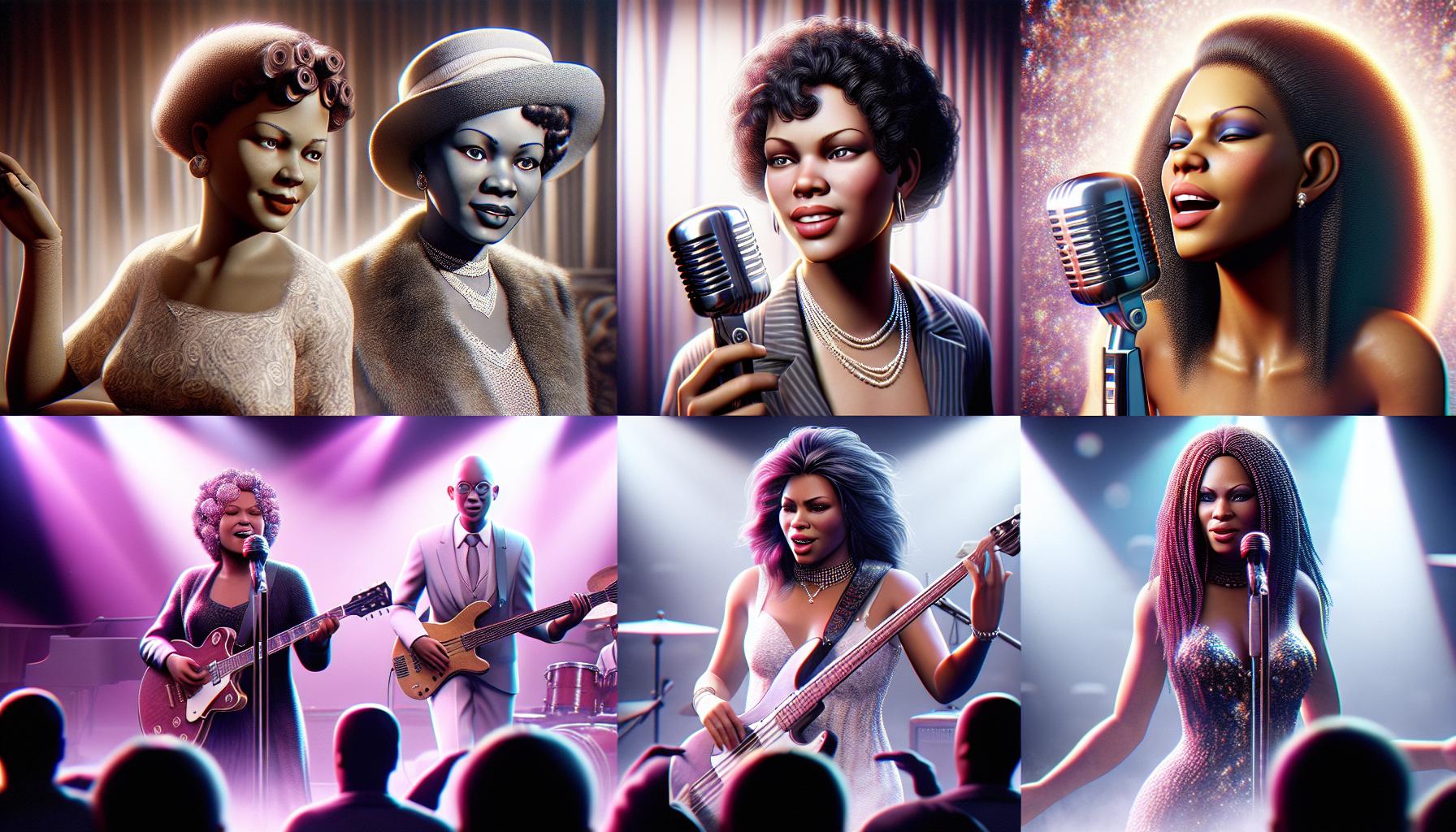Throughout history, women have played a pivotal role in shaping the music landscape, often overcoming significant barriers to make their voices heard. From groundbreaking composers to iconic performers, their contributions have not only enriched the art form but also challenged societal norms. Despite facing obstacles, these trailblazers have left an indelible mark on genres ranging from classical to pop.
As the music industry continues to evolve, the stories of women in music history deserve recognition and celebration. Their journeys reflect resilience and creativity, inspiring future generations of artists. By exploring the legacies of these remarkable women, we uncover the rich tapestry of talent that has influenced the soundtracks of our lives.
Key Takeaways
- Significant Contributions: Women have played a crucial role in shaping various musical genres throughout history, from classical to contemporary, despite facing significant disparities.
- Trailblazers and Icons: Notable figures such as Clara Schumann, Billie Holiday, and Aretha Franklin have paved the way for future generations, transforming the music landscape through their talent and resilience.
- Ongoing Challenges: Societal barriers and industry inequities have historically limited women’s roles in music, leading to underrepresentation in key areas such as production and recognition.
- Recognition and Legacy: Increased awards and accolades for women in music, such as those from the Grammy Awards, highlight their contributions, but disparities still exist and need addressing.
- Inspiring Future Generations: The legacies of women in music continue to inspire new artists, emphasizing the need for inclusive representation and ongoing support in the industry.
Women In Music History
Women in music history have consistently contributed to the evolution of musical genres, despite facing societal challenges. They have been composers, performers, and innovators, shaping the soundscapes of their eras.
Early Contributions
Early contributions from women included significant work in classical music. For example, composers like Clara Schumann and Fanny Mendelssohn played pivotal roles during the 19th century, influencing the Romantic period. Their compositions garnered attention, showcasing women’s abilities in a male-dominated field.
Jazz and Blues Influence
African American women greatly impacted jazz and blues in the 20th century. Artists like Bessie Smith and Billie Holiday broke through racial and gender barriers, bringing soulful expression to the forefront. Their unique voices and styles have inspired countless musicians.
Impact on Contemporary Music
Contemporary music features many prominent female figures. Artists such as Madonna and Beyoncé have redefined pop music, using their platforms to advocate for social issues. Their influence extends beyond music, impacting fashion, culture, and activism.
Recognition and Achievements
Recognition of women in music has increased, highlighted by awards and accolades. The Grammy Awards and Rock and Roll Hall of Fame have honored numerous female artists. However, disparities in recognition persist, underscoring the need for ongoing promotion of women’s contributions.
Representation in Music Industry
Representation remains a crucial topic in the music industry. Women occupy various roles, from songwriters to producers, yet gender imbalance continues. Organizations and initiatives focused on supporting women are vital for fostering equality in this space.
Women in music history demonstrate resilience and creativity, and their legacies continue to inspire future generations. Understanding their journeys reflects the ongoing need for inclusive representation in the music industry.
Pioneers in Music

Women have played pivotal roles in music history, shaping various genres and breaking through societal obstacles. Their contributions as early influencers and trailblazing composers highlight their enduring impact on the music landscape.
Early Influencers
Early influencers formed the foundation of women’s participation in music. Hildegard of Bingen, a 12th-century Benedictine abbess, composed Gregorian chants and founded a musical tradition that inspired future generations. Nannerl Mozart, Wolfgang Amadeus Mozart’s sister, showcased prodigious talents in composition and performance, influencing perceptions of women’s musical capabilities. Additionally, the work of female folk musicians, like those in the African American community, preserved cultural narratives and informed the evolution of American music.
Trailblazing Composers
Trailblazing composers broke barriers in the male-dominated field of classical music. Clara Schumann, both a gifted pianist and composer, played a significant role in the Romantic era, advocating for women’s recognition in the arts. Fanny Mendelssohn, sister of Felix Mendelssohn, composed over 400 pieces while overcoming societal obstacles. They set precedents for later composers such as Amy Beach, the first American woman to achieve prominence as a composer. These women exemplified perseverance, inspiring many to pursue their artistic passions in a challenging environment.
Women in Classical Music

Women have played a vital role in classical music, contributing as composers, performers, and visionaries. Their achievements often occurred in the face of considerable societal challenges.
Notable Composers
Several women composers significantly shaped classical music.
- Clara Schumann: A prominent composer and pianist, Clara Schumann crafted piano works and songs that gained acclaim. Her influence extended beyond her compositions, as she championed her husband Robert Schumann’s music during his career.
- Fanny Mendelssohn: Fanny Mendelssohn, sister of composer Felix Mendelssohn, faced restrictions in her career due to gender norms. Nonetheless, she composed over 460 pieces, including piano works and choral music, demonstrating her remarkable talent.
- Amy Beach: As the first successful American female composer, Amy Beach gained recognition for her pioneering orchestral symphonies and art songs. Her work bridged traditional European styles with American themes.
- Lili Boulanger: The first woman to win the Prix de Rome in 1913, Lili Boulanger composed innovative orchestral and choral works, establishing a legacy that invites exploration and appreciation.
Impact on the Genre
Women’s contributions have left an indelible mark on classical music.
- Challenging Norms: Women composers challenged the gender biases that permeated the classical music industry. Their success paved the way for future generations to pursue music without societal constraints.
- Expanding Repertoire: The works of women like Schumann and Mendelssohn added depth to the classical repertoire, enriching performance programs with diverse perspectives.
- Inspiring Future Generations: Women composers and performers inspired others to enter the field. Modern musicians frequently reference historical figures, ensuring their legacies continue to influence younger artists.
Women’s impact on classical music is profound, challenging norms and enriching the genre’s repertoire through their creativity and determination.
Women in Popular Music

Women have played a transformative role in popular music, shaping genres and influencing cultural movements. Their contributions span decades, marked by innovation, talent, and resilience.
Icons of the 20th Century
Various women became icons in the 20th century, influencing music and society.
- Bessie Smith: Known as the “Empress of the Blues,” she popularized blues music and paved the way for future African American female artists through her powerful voice and emotional performances.
- Billie Holiday: Recognized for her unique vocal style and poignant songs, she brought attention to social issues like racism and inequality, using her music as a platform for change.
- Aretha Franklin: Known as the “Queen of Soul,” she blended gospel, jazz, and R&B, showcasing the influence of African American women in popular music while championing civil rights.
- Debbie Harry: Frontwoman of Blondie, she merged punk and disco, bringing female empowerment to the forefront of the New Wave movement.
- Madonna: Often referred to as the “Queen of Pop,” she revolutionized music videos and embraced themes of sexuality and identity, challenging societal norms and expectations.
Contemporary Artists
Contemporary women continue to push boundaries and redefine popular music.
- Beyoncé: Celebrated for her vocal prowess and diverse musical style, she uses her platform to advocate for feminism and racial equality.
- Taylor Swift: Known for her narrative songwriting, she seamlessly transitions between country and pop, gaining acclaim and breaking records while inspiring young female songwriters.
- Ariana Grande: Her remarkable vocal range and genre-blending songs have made significant contributions to pop music, while her advocacy for mental health awareness resonates with many.
- Billie Eilish: With her unique sound and aesthetic, she transformed the music landscape, emphasizing authenticity and emotional expression in her work.
- Lady Gaga: Known for her artistic expression and advocacy for LGBTQ+ rights, she challenges conventional notions of identity and fame through her music and performances.
Challenges Faced by Women in Music
Women in music history confronted numerous challenges that persisted through eras and genres. These obstacles range from societal barriers to industry inequities that have often stifled their contributions and recognition.
Societal Barriers
Societal expectations historically limited women’s roles in music. Attitudes regarding gender appropriateness often deemed music as an unsuitable career for women, relegating them to supportive functions rather than leading roles. Family obligations frequently impeded women’s ability to pursue music professionally, particularly in the 19th and early 20th centuries. For instance, many women composers had to balance domestic responsibilities, decreasing their public performances and compositions. Additionally, cultural perceptions of women as muses rather than creators further marginalized their contributions, impacting their recognition and legacy in the music industry.
Industry Inequities
Industry inequities continue to challenge women in music today. Women face underrepresentation in production and engineering roles, with only 2% of female producers in the top 600 songs of 2020. Award nominations also reflect bias, as research shows men receive a larger proportion of recognition in major music awards. Furthermore, access to resources, funding, and networking opportunities often favors male counterparts, limiting women’s careers. These inequities create barriers to entry, making it challenging for women to attain equal footing in a predominantly male-driven industry.
The Journey Of Women In Music History
The journey of women in music history is one of resilience and creativity. Their contributions have not only shaped musical genres but also challenged societal norms. As the industry continues to evolve, recognizing and celebrating these trailblazers remains crucial.
Future generations of artists can draw inspiration from the legacies of women who broke barriers and redefined their roles. By fostering an inclusive environment, the music world can ensure that women’s voices are amplified and celebrated for years to come. The impact of women in music is profound and enduring, paving the way for a richer and more diverse musical landscape.